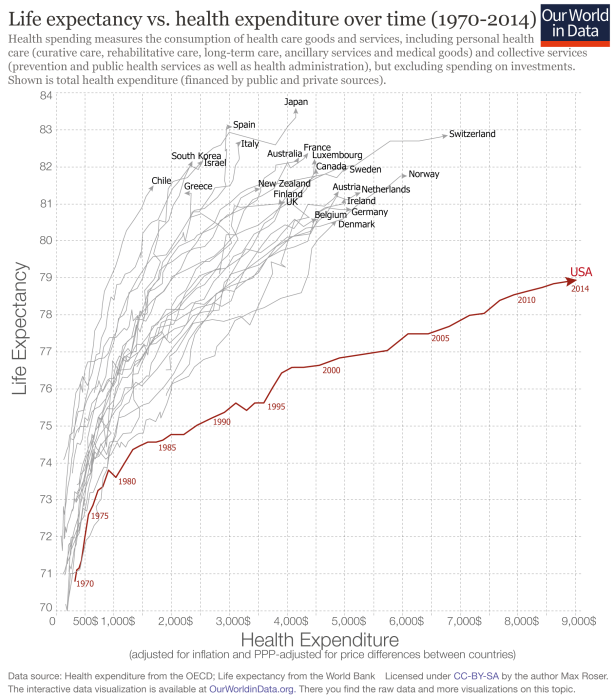From David Ruccio While I was finishing up the latest right-wing libertarian dystopian finance novel, I was also trying to figure out the dystopia that the U.S. healthcare system has become. Clearly, for most Americans, the combination of private healthcare and private health insurance (and, now with Obamacare, public subsidies) is a nightmare. There is a glaring contradiction between healthy profits and the health of the U.S. population. Over the course of the next couple of weeks, I plan to explore various dimensions of that system. To start with, consider how much of an outlier the United States is in terms of expenditures and outcomes compared to other countries. As Max Roser explains, the US spends far more on health than any other country, yet the life expectancy of the American population is not longer but actually shorter than in other countries that spend far less. If we look at the time trend for each country we first notice that all countries have followed an upward trajectory – the population lives increasingly longer as health expenditure increased. But again the US stands out as the the country is following a much flatter trajectory; gains in life expectancy from additional health spending in the U.S. were much smaller than in the other high-income countries, particularly since the mid-1980s.
Topics:
David F. Ruccio considers the following as important: Uncategorized
This could be interesting, too:
tom writes The Ukraine war and Europe’s deepening march of folly
Stavros Mavroudeas writes CfP of Marxist Macroeconomic Modelling workgroup – 18th WAPE Forum, Istanbul August 6-8, 2025
Lars Pålsson Syll writes The pretence-of-knowledge syndrome
Dean Baker writes Crypto and Donald Trump’s strategic baseball card reserve
from David Ruccio
While I was finishing up the latest right-wing libertarian dystopian finance novel, I was also trying to figure out the dystopia that the U.S. healthcare system has become.
Clearly, for most Americans, the combination of private healthcare and private health insurance (and, now with Obamacare, public subsidies) is a nightmare. There is a glaring contradiction between healthy profits and the health of the U.S. population. Over the course of the next couple of weeks, I plan to explore various dimensions of that system.
To start with, consider how much of an outlier the United States is in terms of expenditures and outcomes compared to other countries. As Max Roser explains,
the US spends far more on health than any other country, yet the life expectancy of the American population is not longer but actually shorter than in other countries that spend far less.
If we look at the time trend for each country we first notice that all countries have followed an upward trajectory – the population lives increasingly longer as health expenditure increased. But again the US stands out as the the country is following a much flatter trajectory; gains in life expectancy from additional health spending in the U.S. were much smaller than in the other high-income countries, particularly since the mid-1980s.
This development led to a large inequality between the US and other rich countries: In the US health spending per capita is often more than three-times higher than in other rich countries, yet the populations of countries with much lower health spending than the US enjoy considerably longer lives. In the most extreme case we see that Americans spend 5-times more than Chileans, but the population of Chile actually lives longer than Americans.

